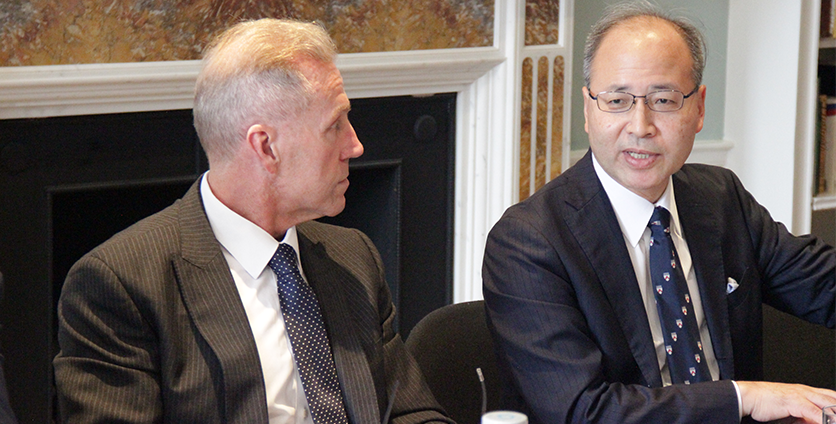Driving commercial and political engagement between Asia, the Middle East and Europe
Driving commercial and political engagement between Asia, the Middle East and Europe
Driving commercial and political engagement between Asia, the Middle East and Europe

Japan is well placed to overcome its current economic challenges, a leading economist told Asia House corporate members and invited guests on Monday.
Hajime Takata, Chief Economist at the Mizuho Research Institute, said he believed the economic policies being followed by Prime Minister Shinzo Abe are proving positive, but need more time to succeed.
“Abenomics is an unfinished story,” he said.
Abenomics – a matter of time
In a lively presentation, Mr Takata described Japan’s economy over the last two decades as ‘frozen’, having transformed from the “carnivore” of the 1980s into a more recent “herbivore”.
However, while the economy has begun to shift under the leadership of Prime Minister Abe and the policies of the Bank of Japan, the public mindset has not, Mr Takata said.
“Five years is not enough time to change a mindset that has been around since the 1990s. I think another three or four years are necessary.
“This is the main reason [Mr Abe] has called the election now.”
Consumer tax to fund childcare
Mr Takata was speaking at Asia House on the day that Prime Minister Abe called a general election and outlined a 2-trillion-yen package to support education and childcare in a bid to encourage more women to enter the workforce.
The spending will be sourced from the two per cent rise in consumer tax, to 10 per cent, expected in 2019, and aims to temper labour-shortage concerns linked to Japan’s ageing population.
Abe’s prospects for victory look favourable, with numerical insulation in parliament and a public appetite for continuity amid tensions with North Korea.
Mr Takata said Japan’s surplus, economic policies, and the future opportunities presented by the 2020 Olympics and growing Asian economy all point to a bright future for Japan.
Challenges ahead
While Mr Takata’s economic predictions were largely positive, there are still major challenges facing Japan – a theme explored in a series of questions put forward at the briefing.
Asked about Japan’s high levels of debt, Mr Takata highlighted the domestic nature of Japanese borrowing, suggesting that this distinguishes the country’s economic risk from those such as Greece.
“Japan has large debt, but this is mainly financed in Japan. Current account levels have remained fairly stable and I see this continuing. Interest rates will need careful management and cooperation between the Bank of Japan and the government will be important,” he said. “But I don’t see big risk.”
Pensions are another area where Japan faces challenges, with high life expectancy creating the longest pension-spending period in the world. Mr Takata predicted a gradual shift to a later retirement age in order to address this issue, and pointed to the consumer tax rise in 2019 as a source of increased healthcare funding.
Olympic gains
The Olympic Games, which Japan will host in 2020, are also expected to give the economy a boost, alongside increases in tourism. This led to a question on how exposed Japanese growth is to foreign demand.
“Japan’s economic balance is shifting. Exports of manufactured goods are reducing, but export services – which includes tourism – are on the rise,” Mr Takata said, citing the rude health of the global economy as another cause for optimism.
“But Japan is not as reliant on overseas investment as it used to be,” he added.
Japan and the world
Mr Takata emphasised Japan’s enduring importance to the global economy, saying that a successful Abe would gain membership of ‘Club 21’ – the predicted group of world leaders who will be in place in 2021.
By this time, Abenomics should be pushing Japan more towards its previous ‘carnivore’ status, Mr Takata predicted.
One Asia House guest took the opportunity to ask Mr Takata about Japan’s trade partnerships, particularly with a view to China and the Belt and Road Initiative.
“I think a Japan-China FTA would be very beneficial to both countries,” Mr Takata said. “The Chinese market is enormous. From the Japanese side I think it would be great, but it might be harder from the Chinese side.”
He added that he expected Japan to join the AIIB in the future, and that infrastructure is likely to present investment opportunities in the near term.
“There’s huge potential in the need to modernise Japan’s ageing infrastructure,” he said.
In 2030, there will be an estimated 35-trn-yen investment required for the construction of public buildings and facilities in Japan, according to Mr Takata’s report, ‘Abenomics’: Past, Present and Future.
